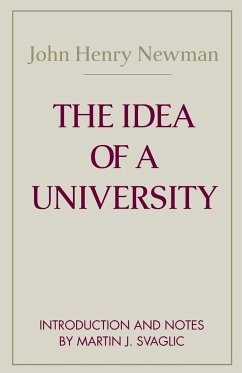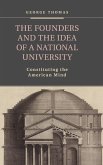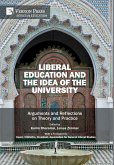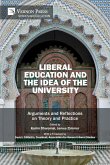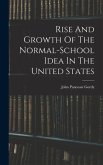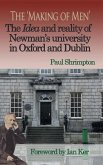- Broschiertes Buch
- Merkliste
- Auf die Merkliste
- Bewerten Bewerten
- Teilen
- Produkt teilen
- Produkterinnerung
- Produkterinnerung
"The Idea of a University [is an] eloquent defense of a liberal education which is perhaps the most timeless of all [Newman's] books and certainly the one most intellectually accessible to readers of every religious faith and of none. . . . [O]nly one who has read The Idea of a University in its entirety, especially the nine discourses, can hope to understand why its reputation is so high: why the first reading of this book has been called an 'epoch' in the life of a college man; why Walter Pater thought it 'the perfect handling of a theory'; why the historian G. M. Young has ranked it with…mehr
Andere Kunden interessierten sich auch für
![The Home Life, in the Light of its Divine Idea The Home Life, in the Light of its Divine Idea]() James Baldwin BrownThe Home Life, in the Light of its Divine Idea32,99 €
James Baldwin BrownThe Home Life, in the Light of its Divine Idea32,99 €![The Founders and the Idea of a National University The Founders and the Idea of a National University]() George ThomasThe Founders and the Idea of a National University111,99 €
George ThomasThe Founders and the Idea of a National University111,99 €![Idea of the American University Idea of the American University]() Idea of the American University110,99 €
Idea of the American University110,99 €![Liberal Education and the Idea of the University Liberal Education and the Idea of the University]() Liberal Education and the Idea of the University70,99 €
Liberal Education and the Idea of the University70,99 €![Liberal Education and the Idea of the University Liberal Education and the Idea of the University]() Liberal Education and the Idea of the University56,99 €
Liberal Education and the Idea of the University56,99 €![Rise And Growth Of The Normal-school Idea In The United States Rise And Growth Of The Normal-school Idea In The United States]() Rise And Growth Of The Normal-school Idea In The United States30,99 €
Rise And Growth Of The Normal-school Idea In The United States30,99 €![The 'Making of Men'. The Idea and Reality of Newman's university in Oxford and Dublin The 'Making of Men'. The Idea and Reality of Newman's university in Oxford and Dublin]() Paul ShrimptonThe 'Making of Men'. The Idea and Reality of Newman's university in Oxford and Dublin59,99 €
Paul ShrimptonThe 'Making of Men'. The Idea and Reality of Newman's university in Oxford and Dublin59,99 €-
-
-
"The Idea of a University [is an] eloquent defense of a liberal education which is perhaps the most timeless of all [Newman's] books and certainly the one most intellectually accessible to readers of every religious faith and of none. . . . [O]nly one who has read The Idea of a University in its entirety, especially the nine discourses, can hope to understand why its reputation is so high: why the first reading of this book has been called an 'epoch' in the life of a college man; why Walter Pater thought it 'the perfect handling of a theory'; why the historian G. M. Young has ranked it with Aristotle's Ethics among the most valuable of all works on the aim of Education; or why Sir Arthur Quiller-Couch told his students at Cambridge that 'of all the books written in these hundred years there is perhaps none you can more profitably thumb and ponder.'" -from the introduction by Martin J. Svaglic
Produktdetails
- Produktdetails
- Verlag: University of Notre Dame Press
- Seitenzahl: 482
- Erscheinungstermin: 31. Oktober 1992
- Englisch
- Abmessung: 216mm x 140mm x 29mm
- Gewicht: 674g
- ISBN-13: 9780268011505
- ISBN-10: 0268011508
- Artikelnr.: 25684365
- Herstellerkennzeichnung
- Libri GmbH
- Europaallee 1
- 36244 Bad Hersfeld
- gpsr@libri.de
- Verlag: University of Notre Dame Press
- Seitenzahl: 482
- Erscheinungstermin: 31. Oktober 1992
- Englisch
- Abmessung: 216mm x 140mm x 29mm
- Gewicht: 674g
- ISBN-13: 9780268011505
- ISBN-10: 0268011508
- Artikelnr.: 25684365
- Herstellerkennzeichnung
- Libri GmbH
- Europaallee 1
- 36244 Bad Hersfeld
- gpsr@libri.de
British theologian John Henry Cardinal Newman (1801-1890) was a leading figure in both the Church of England and, after his conversion, the Roman Catholic Church and was known as "The Father of the Second Vatican Council." His Parochial and Plain Sermons (1834-42) is considered the best collection of sermons in the English language. He is also the author of A Grammar of Assent (1870).
The view taken of a University in these Discourses is the following: That
it is a place of teaching universal knowledge. This implies that its object
is, on the one hand, intellectual, not moral; and, on the other, that it is
the diffusion and extension of knowledge rather than the advancement. If
its object were scientific and philosophical discovery, I do not see why a
University should have students; if religious training, I do not see how it
can be the seat of literature and science.
Such is a University in its essence, and independently of its relation to
the Church. But, practically speaking, it cannot fulfill its object duly,
such as I have described it, without the Church's assistance; or, to use
the theological term, the Church is necessary for its integrity. Not that
its main characters are changed by this incorporation: it still has the
office of intellectual education; but the Church steadies it in the
performance of that office.
Such are the main principles of the Discourses which follow; though it
would be unreasonable for me to expect that I have treated so large and
important a field of thought with the fulness and precision necessary to
secure me from incidental misconceptions of my meaning on the part of the
reader. It is true, there is nothing novel or singular in the argument
which I have been pursuing, but this does not protect me from such
misconceptions; for the very circumstance that the views I have been
delineating are not original with me may lead to false notions as to my
relations in opinion towards those from whom I happened in the first
instance to learn them, and may cause me to be interpreted by the objects
or sentiments of schools to which I should be simply opposed.
For instance, some persons may be tempted to complain, that I have
servilely followed the English idea of a University, to the disparagement
of that Knowledge which I profess to be so strenuously upholding; and they
may anticipate that an academical system, formed upon my model, will result
in nothing better or higher than in the production of that antiquated
variety of human nature and remnant of feudalism, as they consider it,
called "a gentleman." Now, I have anticipated this charge in various parts
of my discussion; if, however, any Catholic is found to prefer it (and to
Catholics of course this Volume is primarily addressed), I would have him
first of all ask himself the previous question, what he conceives to be the
reason contemplated by the Holy See in recommending just now to the Irish
Hierarchy the establishment of a Catholic University? Has the Supreme
Pontiff recommended it for the sake of the Sciences, which are to be the
matter, and not rather of the Students, who are to be the subjects, of its
teaching? Has he any obligation or duty at all towards secular knowledge as
such? Would it become his Apostolical Ministry, and his descent from the
Fisherman, to have a zeal for the Baconian or other philosophy of man for
its own sake? Is the Vicar of Christ bound by office or by vow to be the
preacher of the theory of gravitation, or a martyr for electro-magnetism?
Would he be acquitting himself of the dispensation committed to him if he
were smitten with an abstract love of these matters, however true, or
beautiful, or ingenious, or useful? Or rather, does he not contemplate such
achievements of the intellect, as far as he contemplates them, solely and
simply in their relation to the interests of Revealed Truth? Surely, what
he does he does for the sake of Religion; if he looks with satisfaction on
strong temporal governments, which promise perpetuity, it is for the sake
of Religion; and if he encourages and patronizes art and science, it is for
the sake of Religion. He rejoices in the widest and most philosophical
systems of intellectual education, from an intimate conviction that Truth
is his real ally, as it is his profession; and that Knowledge and Reason
are sure ministers to Faith.
(from the introduction)
it is a place of teaching universal knowledge. This implies that its object
is, on the one hand, intellectual, not moral; and, on the other, that it is
the diffusion and extension of knowledge rather than the advancement. If
its object were scientific and philosophical discovery, I do not see why a
University should have students; if religious training, I do not see how it
can be the seat of literature and science.
Such is a University in its essence, and independently of its relation to
the Church. But, practically speaking, it cannot fulfill its object duly,
such as I have described it, without the Church's assistance; or, to use
the theological term, the Church is necessary for its integrity. Not that
its main characters are changed by this incorporation: it still has the
office of intellectual education; but the Church steadies it in the
performance of that office.
Such are the main principles of the Discourses which follow; though it
would be unreasonable for me to expect that I have treated so large and
important a field of thought with the fulness and precision necessary to
secure me from incidental misconceptions of my meaning on the part of the
reader. It is true, there is nothing novel or singular in the argument
which I have been pursuing, but this does not protect me from such
misconceptions; for the very circumstance that the views I have been
delineating are not original with me may lead to false notions as to my
relations in opinion towards those from whom I happened in the first
instance to learn them, and may cause me to be interpreted by the objects
or sentiments of schools to which I should be simply opposed.
For instance, some persons may be tempted to complain, that I have
servilely followed the English idea of a University, to the disparagement
of that Knowledge which I profess to be so strenuously upholding; and they
may anticipate that an academical system, formed upon my model, will result
in nothing better or higher than in the production of that antiquated
variety of human nature and remnant of feudalism, as they consider it,
called "a gentleman." Now, I have anticipated this charge in various parts
of my discussion; if, however, any Catholic is found to prefer it (and to
Catholics of course this Volume is primarily addressed), I would have him
first of all ask himself the previous question, what he conceives to be the
reason contemplated by the Holy See in recommending just now to the Irish
Hierarchy the establishment of a Catholic University? Has the Supreme
Pontiff recommended it for the sake of the Sciences, which are to be the
matter, and not rather of the Students, who are to be the subjects, of its
teaching? Has he any obligation or duty at all towards secular knowledge as
such? Would it become his Apostolical Ministry, and his descent from the
Fisherman, to have a zeal for the Baconian or other philosophy of man for
its own sake? Is the Vicar of Christ bound by office or by vow to be the
preacher of the theory of gravitation, or a martyr for electro-magnetism?
Would he be acquitting himself of the dispensation committed to him if he
were smitten with an abstract love of these matters, however true, or
beautiful, or ingenious, or useful? Or rather, does he not contemplate such
achievements of the intellect, as far as he contemplates them, solely and
simply in their relation to the interests of Revealed Truth? Surely, what
he does he does for the sake of Religion; if he looks with satisfaction on
strong temporal governments, which promise perpetuity, it is for the sake
of Religion; and if he encourages and patronizes art and science, it is for
the sake of Religion. He rejoices in the widest and most philosophical
systems of intellectual education, from an intimate conviction that Truth
is his real ally, as it is his profession; and that Knowledge and Reason
are sure ministers to Faith.
(from the introduction)
The view taken of a University in these Discourses is the following: That
it is a place of teaching universal knowledge. This implies that its object
is, on the one hand, intellectual, not moral; and, on the other, that it is
the diffusion and extension of knowledge rather than the advancement. If
its object were scientific and philosophical discovery, I do not see why a
University should have students; if religious training, I do not see how it
can be the seat of literature and science.
Such is a University in its essence, and independently of its relation to
the Church. But, practically speaking, it cannot fulfill its object duly,
such as I have described it, without the Church's assistance; or, to use
the theological term, the Church is necessary for its integrity. Not that
its main characters are changed by this incorporation: it still has the
office of intellectual education; but the Church steadies it in the
performance of that office.
Such are the main principles of the Discourses which follow; though it
would be unreasonable for me to expect that I have treated so large and
important a field of thought with the fulness and precision necessary to
secure me from incidental misconceptions of my meaning on the part of the
reader. It is true, there is nothing novel or singular in the argument
which I have been pursuing, but this does not protect me from such
misconceptions; for the very circumstance that the views I have been
delineating are not original with me may lead to false notions as to my
relations in opinion towards those from whom I happened in the first
instance to learn them, and may cause me to be interpreted by the objects
or sentiments of schools to which I should be simply opposed.
For instance, some persons may be tempted to complain, that I have
servilely followed the English idea of a University, to the disparagement
of that Knowledge which I profess to be so strenuously upholding; and they
may anticipate that an academical system, formed upon my model, will result
in nothing better or higher than in the production of that antiquated
variety of human nature and remnant of feudalism, as they consider it,
called "a gentleman." Now, I have anticipated this charge in various parts
of my discussion; if, however, any Catholic is found to prefer it (and to
Catholics of course this Volume is primarily addressed), I would have him
first of all ask himself the previous question, what he conceives to be the
reason contemplated by the Holy See in recommending just now to the Irish
Hierarchy the establishment of a Catholic University? Has the Supreme
Pontiff recommended it for the sake of the Sciences, which are to be the
matter, and not rather of the Students, who are to be the subjects, of its
teaching? Has he any obligation or duty at all towards secular knowledge as
such? Would it become his Apostolical Ministry, and his descent from the
Fisherman, to have a zeal for the Baconian or other philosophy of man for
its own sake? Is the Vicar of Christ bound by office or by vow to be the
preacher of the theory of gravitation, or a martyr for electro-magnetism?
Would he be acquitting himself of the dispensation committed to him if he
were smitten with an abstract love of these matters, however true, or
beautiful, or ingenious, or useful? Or rather, does he not contemplate such
achievements of the intellect, as far as he contemplates them, solely and
simply in their relation to the interests of Revealed Truth? Surely, what
he does he does for the sake of Religion; if he looks with satisfaction on
strong temporal governments, which promise perpetuity, it is for the sake
of Religion; and if he encourages and patronizes art and science, it is for
the sake of Religion. He rejoices in the widest and most philosophical
systems of intellectual education, from an intimate conviction that Truth
is his real ally, as it is his profession; and that Knowledge and Reason
are sure ministers to Faith.
(from the introduction)
it is a place of teaching universal knowledge. This implies that its object
is, on the one hand, intellectual, not moral; and, on the other, that it is
the diffusion and extension of knowledge rather than the advancement. If
its object were scientific and philosophical discovery, I do not see why a
University should have students; if religious training, I do not see how it
can be the seat of literature and science.
Such is a University in its essence, and independently of its relation to
the Church. But, practically speaking, it cannot fulfill its object duly,
such as I have described it, without the Church's assistance; or, to use
the theological term, the Church is necessary for its integrity. Not that
its main characters are changed by this incorporation: it still has the
office of intellectual education; but the Church steadies it in the
performance of that office.
Such are the main principles of the Discourses which follow; though it
would be unreasonable for me to expect that I have treated so large and
important a field of thought with the fulness and precision necessary to
secure me from incidental misconceptions of my meaning on the part of the
reader. It is true, there is nothing novel or singular in the argument
which I have been pursuing, but this does not protect me from such
misconceptions; for the very circumstance that the views I have been
delineating are not original with me may lead to false notions as to my
relations in opinion towards those from whom I happened in the first
instance to learn them, and may cause me to be interpreted by the objects
or sentiments of schools to which I should be simply opposed.
For instance, some persons may be tempted to complain, that I have
servilely followed the English idea of a University, to the disparagement
of that Knowledge which I profess to be so strenuously upholding; and they
may anticipate that an academical system, formed upon my model, will result
in nothing better or higher than in the production of that antiquated
variety of human nature and remnant of feudalism, as they consider it,
called "a gentleman." Now, I have anticipated this charge in various parts
of my discussion; if, however, any Catholic is found to prefer it (and to
Catholics of course this Volume is primarily addressed), I would have him
first of all ask himself the previous question, what he conceives to be the
reason contemplated by the Holy See in recommending just now to the Irish
Hierarchy the establishment of a Catholic University? Has the Supreme
Pontiff recommended it for the sake of the Sciences, which are to be the
matter, and not rather of the Students, who are to be the subjects, of its
teaching? Has he any obligation or duty at all towards secular knowledge as
such? Would it become his Apostolical Ministry, and his descent from the
Fisherman, to have a zeal for the Baconian or other philosophy of man for
its own sake? Is the Vicar of Christ bound by office or by vow to be the
preacher of the theory of gravitation, or a martyr for electro-magnetism?
Would he be acquitting himself of the dispensation committed to him if he
were smitten with an abstract love of these matters, however true, or
beautiful, or ingenious, or useful? Or rather, does he not contemplate such
achievements of the intellect, as far as he contemplates them, solely and
simply in their relation to the interests of Revealed Truth? Surely, what
he does he does for the sake of Religion; if he looks with satisfaction on
strong temporal governments, which promise perpetuity, it is for the sake
of Religion; and if he encourages and patronizes art and science, it is for
the sake of Religion. He rejoices in the widest and most philosophical
systems of intellectual education, from an intimate conviction that Truth
is his real ally, as it is his profession; and that Knowledge and Reason
are sure ministers to Faith.
(from the introduction)

